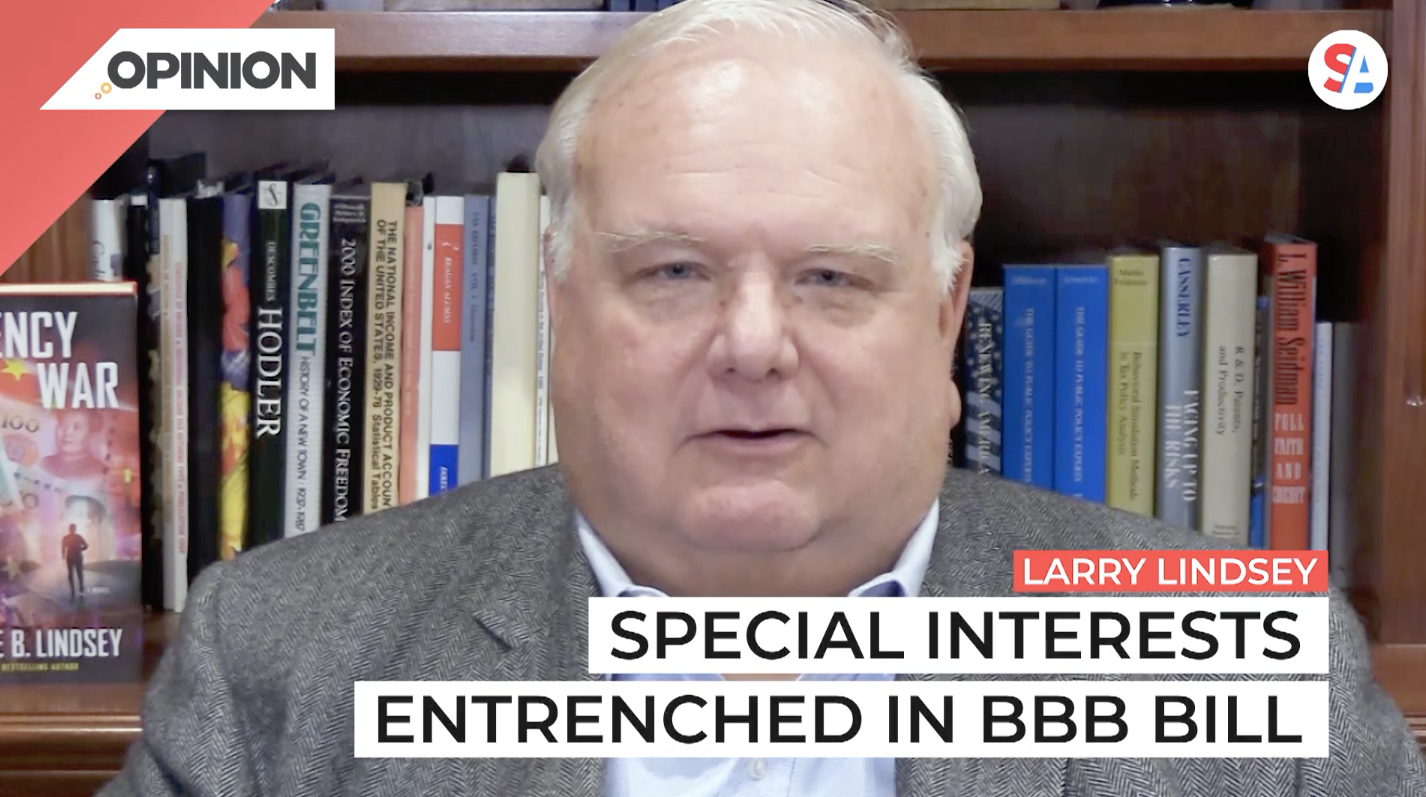
Commentary
-
Our commentary partners will help you reach your own conclusions on complex topics.
When legislation moves in Washington, all the special interests come out, and they’re particularly powerful when there’s no cohesive decision happening from the White House.
Then we have three sections of the government, the House, the Senate, and the White House, all quibbling over special interest provisions.
The Build Back Better legislation that’s now moving through the Congress is no exception. And one of the biggest gainers in that legislation are labor unions.
In fact, some of the legislation is directly targeted to favor them.
Let’s start with, I think, one of the biggest provisions in the bill and that’s universal pre-K, uh, pre kindergarten, that is child care.
Speaker Pelosi said the bill is all about the children. Well, it’s also all about union jobs. For example, the legislation is very generous. Everyone making under say $50,000 basically gets free child care. It then phases out slowly, but even a family making $65,000 is capped at only having to pay $1,300 for childcare.
The federal government is basically going to pick up 90% of all child care expenses under this bill, but there’s an asterisk attached to that 90%. You have to be an approved, recognized childcare provider.
I.E. grandma no longer counts as a childcare provider for getting the subsidy nor do neighbors, aunts, uncles, or couples who simply trade off for the each other in order to work their schedules around child care. No, none of that works.
You really have to be a big child care company in order to qualify for this 90% subsidy. That pushes almost everyone else out of the market.
Not only that, if you are regulated, there are all kinds of conditions placed on who you can hire. For example, the bill requires that everyone providing child care be paid the same amount as elementary school teachers in their area. Well, that’s a big difference. Elementary school teachers on average make around $61,000. Child care providers make only about $25,000.
So this will more than double the cost of hiring people to work in child care centers. In addition, there are a whole bunch of licensing requirements. Effectively, you’re gonna need a college degree in order to work in a child care center. I’m not exactly sure what that helps with. Being a mom, I would think, or a dad would be wonderful training for working in a child care center, as opposed to being an English major or even an economics major. Probably isn’t gonna help you very much, but effectively everyone is going to have to have a college degree in order to work in these areas.
Well, when you start putting all of these provisions in and you push up the amount of the wages, then you suddenly make unions attractive because the union is there to represent people with particular interest, particular skill sets.
And you don’t have to worry about competition from non-union people because they don’t qualify for the jobs. In fact, the District of Columbia, which was looking at a similar provision, estimated that child care costs to people will double with that kind of provision in place.
I’m not sure that really this is then all about the children.
Well, there are some other issues as well. There was a $2.5 billion provision put in the bill simply to help providers of home care on how to unionize, not to help provide adult care, but how to unionize those workers.
In addition, the energy efficiency provisions, now give you $14,000 to update your house. I think that’s a great idea, way of saving energy, but there’s an exception. In order to get the $14,000 credit, you have to hire a union firm in order to do the work. Well, 95% of these people who actually do that kind of work are not unionized. They’re basically mom and pop operations. They often hire family members. Your typical construction crew. well they’re out of luck.
You now have to be unionized in order to qualify for this huge $14,000 credit. It doesn’t end there.
Trial lawyers, for example, got a special tax provision in there that’s gonna save them about $2.5 billion dollars. They’re gonna be allowed to deduct the costs of conducting one of their trials before the trial even ends, which is different from current law.
In addition, they are changing the provisions involving the deduction of state and local taxes.
Well, these are provisions that only favor the very rich. For example, under the legislation, people in the top 1% will get an average tax cut of over $14,000. Everyone else gets an average tax deduction of $214, $214, 1/70th what the top 1% gets.
In fact, the distributional effects of this bill really are quite murky, not just on changes in state and local tax deduction, shelling money out to a trial lawyers. But also with regard to how much it’s going to hurt your basic entry-level opportunity areas, home construction and home refurbishing for example, is a very popular industry for people without college degrees, including a lot of Hispanic families to begin working in.
In addition, when you say you’ve got to have a college degree in order to do child care, that pretty much shuts out being a child care provider as a good job, oftentimes for second earners.
So the effect of this bill is actually much different than what people think. Special interest power is well entrenched in the bill, and we’re just gonna have to see whether the special interests in the end prevail.
-
Election 2024 will boil down to the Great Lakes states
Pollsters and pundits have been engaged in a long debate about how Biden or Trump might win the 2024 election, with much of their focus spent on the “swing state” electoral battlegrounds. While the winners of Alabama or California may be obvious, for instance, who wins Pennsylvania is a more difficult question. Watch the above…
-
Why the Fed should consider Theory of Reflexivity when fixing policy
The Theory of Reflexivity, often used in the context of economics and financial markets, implies that investors don’t base their decisions on reality but on their perceptions of reality. This creates a feedback loop where investors’ perceptions influence economic fundamentals, which in turn alter investor perceptions. Watch the above video as Straight Arrow News contributor…
-
Federal Reserve surpassed its own wildest expectations
On May 14, the U.S. Bureau of Labor Statistics released the most current producer price index (PPI) report, which showed an increase of 0.5% month-over-month in April. After the report’s release, U.S. Federal Reserve chairman Jerome “Jay” Powell said that while he believes the current policy rate is restrictive by many measures, the Fed needs…
-
Polls give slight advantage to Trump in Electoral College
With the U.S. general election only six months away, leading candidates President Joe Biden and former President Donald Trump appear to be engaged in a very close contest. In their 2020 race, the winner of the Electoral College was ultimately determined by a relative handful of voters in just a few swing states, even though…
-
College sports is big money but not everyone benefits
March Madness has wrapped up and Caitlin Clark has emerged as a household name as well as a wealthy student athlete. Earning over $3 million throughout her college career, her success stands in stark contrast to the previous notion that collegiate athletes shouldn’t earn anything beyond their scholarship. Straight Arrow News contributor Larry Lindsey examines…
Latest Opinions
-
 U.S. Department of Defense
U.S. Department of Defense
Congress still trying to figure out how to reduce wasteful military spending
-
 DVIDS
DVIDS
US Navy, Air Force making waves with new weapons at RIMPAC
-
 Getty Images
Getty Images
Israeli PM Netanyahu meets with Trump at Mar-a-Lago
-
 Getty Images
Getty Images
Growing US nuclear power resurgence reaches the nation’s heartland
-
 Getty Images
Getty Images
Beer from the sun, other solar thermal projects get government funding
Popular Opinions
-
In addition to the facts, we believe it’s vital to hear perspectives from all sides of the political spectrum.


